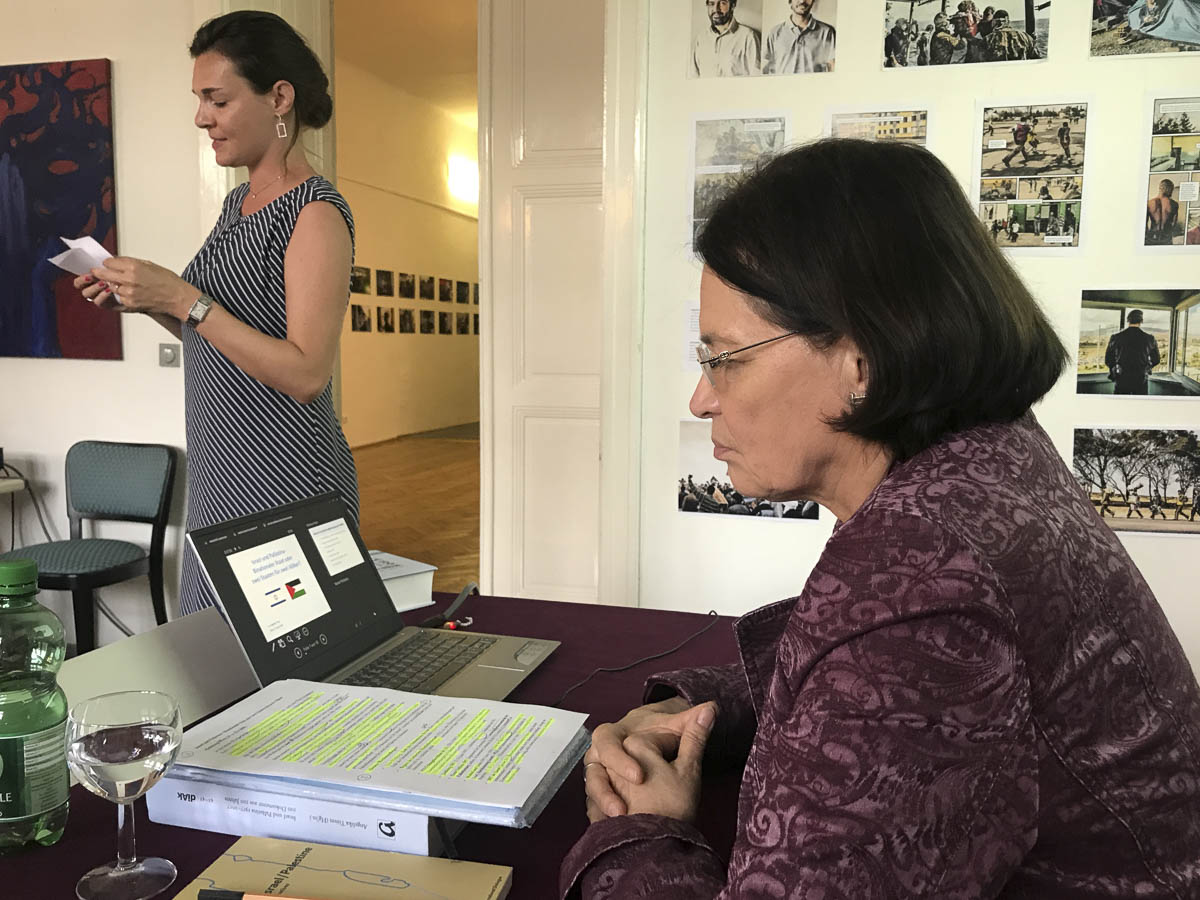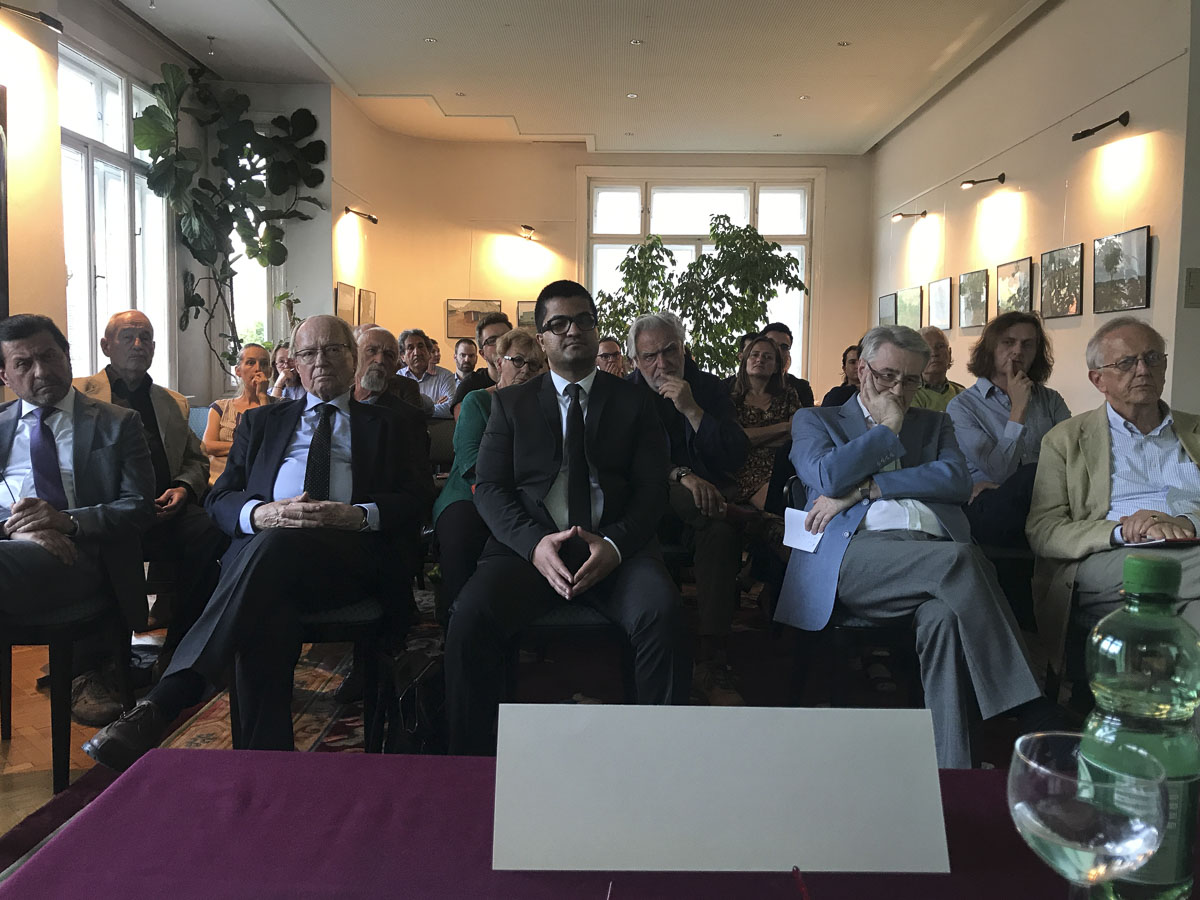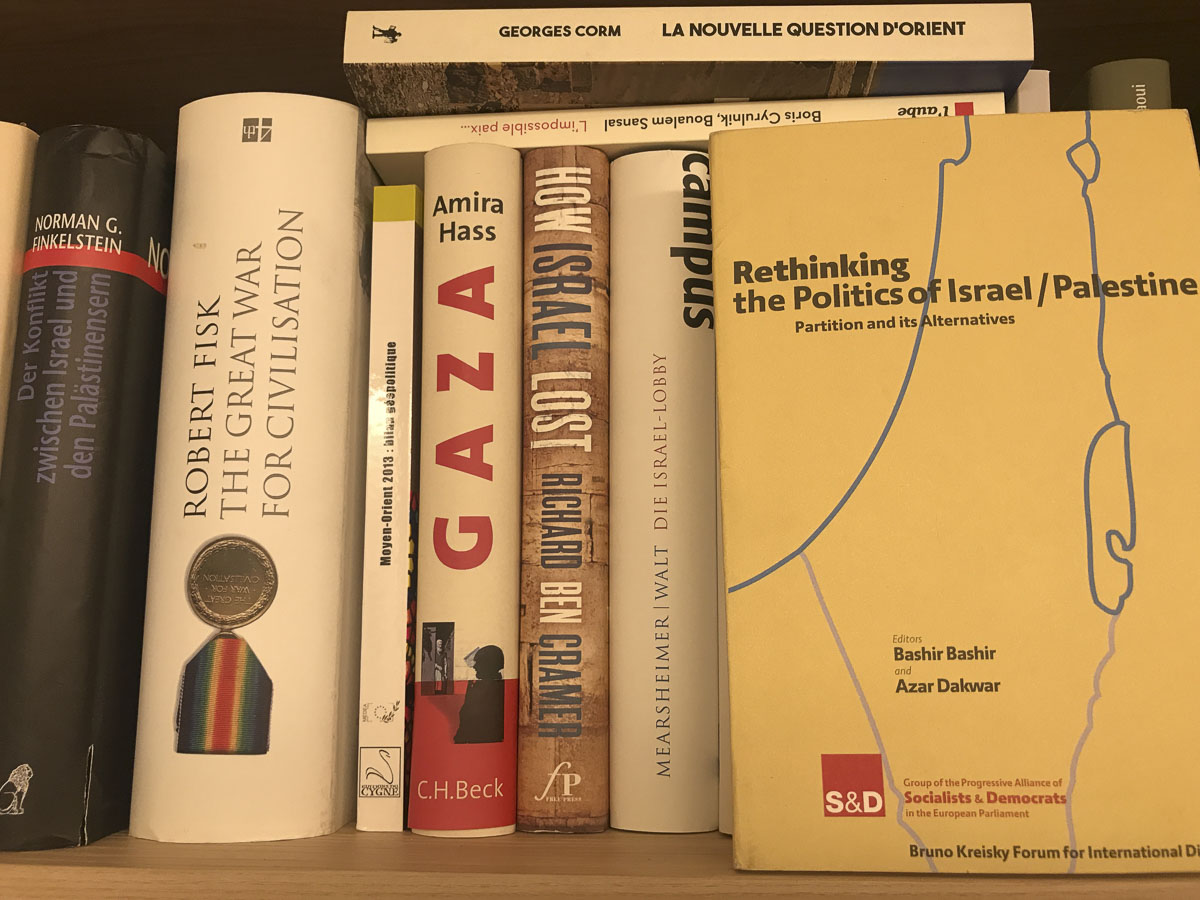ISRAEL, PALESTINE AND STILL NO PEACE
Angelika Timm undertook the difficult task to collect the many peace initiatives concerning Israel and Palestine in one book. When the International Institute for Peace got the offer from the newly founded Austrian chapter of the „New Israel Fund“ to present this book the IIP was happy to agree. Especially as the book presentation by the author could take place some days before the 70th anniversary of the foundation of Israel. Even if this conflict is today overshadowed by the bloody events in Syria and Jemen and the competition between Iran and Saudi Arabia, this conflict should not be forgotten. In addition for me, it is a conflict with many personal experiences. Certainly my interests in this region was also due to the activities of Bruno Kreisky who was one of the few European politicians who made concrete steps of bringing this conflict to the tables of European politics.


Many missed chances
All my frequent visits – in the past – to Israel and Palestine stay in my remembrance. Not only because I met several times leaders like Simon Peres and Arafat, many foreign ministers of Israel and chief negotiators of the PLO and other politicians. It is the people of both communities who made a strong impression on me. Now due to the celebrations of the 70th anniversary of the foundation of Israel I recall them with nostalgia and sorrow. Too often the small glimmers of hope disappeared and frustration took place. The number of documents of peace efforts that Angelika Timm collected in her books is enormous. One can detect many serious efforts, which nevertheless failed. There would be enough reason to give up any hope and accept the reality of oppression and violence. But there is no guarantee that the situation will not explode – as it exploded several times after Israel’s Declaration of Independence in May 1948.
One can discuss if this Declaration did not come too early, one can ask if the UN should not have acted more wisely by organizing the establishment of two (!) states on the basis of the UN decision of 1947. Certainly the Arab should have acted more diligently and not declare war on Israel without a clear aim and an efficient organization. We cannot decide today how many Arab left „voluntarily‘ and how many have been pushed out of their home with force. What is clear is, that many people have been killed on both sides and both sides committed atrocities. And the conflicts between Israel and the Arab states and of Israel with its own and the – stateless – Palestinians are an endless story.
Israeli settlements
The extension of Israeli settlements and the isolation of Gaza are creating more and more difficulties to find a solution. Especially the often cited two state solution which has been decided by the UN seems hardly imaginable today. One could say – in taking the example of South Africa – that for the Palestinians only an assembly of „bantustans“ remains. That is hardly enough for establishing a viable state. To unfold the interlinked Israeli and Palestinian areas would be very difficult. It would need a withdrawal of many settlers from Palestinian territory. In view of the aggressiveness of many settlers that would be very difficult to realize. And there is no willingness of major Israeli political forces to implement such a policy of „de-settlement“.
The examples of withdrawing of relatively few settlements from Gaza was a special case. I remember still Israeli political analysts and politicians who warned us – a delegation of EU parliamentarians – that we should not recognize in the voluntary withdrawal from Gaza a step towards peace. This action organized by the then prime minister Ariel Sharon did in fact not lead to peace. Gaza remained occupied by Israel. As Gideon Levy from Haaretz wrote recently in the International New York Times: „The jailers who once worked inside the prison now operate outside it, which is more comfortable anyway.“ The recent clashes at the border between Israel and Palestinians from Gaza demonstrated that the unilateral withdrawal did not create better conditions for the people inside the Gaza Strip.
Lack of willingness – lack of readiness
The present Israeli government with prime-minister Netanyahu can only react with force and is not sensitive to criticism. That was also the reason why a prominent Jewish citizens of Vienna whom I met recently on the street told me that he more and more is inclined to agree with my critical attitude towards present day Israel. He was very sad about the indiscriminate use of force against civilians of Gaza.
My criticism towards Israeli political forces does not suppose a lack of criticism of Palestinian politicians. I have met many of them and I have respect for some of them. In fact the Israelis can be happy to have so many politicians on the other side who are not stirring permanent protest and revolution by Palestinians. Some observers and many especially young Palestinians see in the Palestinian police an instrument of Israeli security politics. Certainly there is a growing disappointment of Palestinians with their own leadership and that is reflected in the resistance of that leadership to go for the overdue elections. That is particularly true for the PLO but in the meantime probably also for Hamas.
The issue of Hamas
The Hamas has also no convincing way how to get rid of the Israeli occupation. But it was a big mistake of the West including the EU to boycott this Palestinian political force after it had been voted into government on the basis of democratic election. I personally did never accept that decision and did convince my colleagues in the EU Parliament to meet also those ministers who have been nominated by Hamas – mostly without belonging to Hamas. The boycott of course had been called for by the Israeli government. But there were always more reasonable prominent Israelis who have been pleading for a dialogue between Israelis and Hamas. And in fact such a dialogue did take place, for example in order to enable an exchange of prisoners.
Only recently the former head of Mossad and former ambassador of Israel to the EU Efraim Halevy asked for such a dialogue. In a recent interview with Le Monde he argued, that Israel is victim of its own propaganda, when it declines to talk to those who have influence and power to define the destiny of the Palestinian people and indirectly of Israel itself. All the efforts to beat Hamas could not succeed. In addition Israel should not weaken itself by refusing talks with all Palestinian groups when the possible threats come from the outside for example from Syria and ist future political uncertainties.
Between two states and a binational state
If one wants any solution for the ongoing conflict the dialogue with all relevant forces would be necessary. That is true for the „official“ two state solution promoted by the „international community‘. But also for any other solution such a dialogue is a condition. Unilateral action or agreement only with the PLO will not work. Anyway in the framework of a thorough debate organized by the Bruno Kreisky Forum in Vienna and partly together with the S&D group in Brussels, some of us thought about alternatives to the solutions of two totally separate states. It could be a one state solution with a common state of Jews and Arabs. Such a binational state is neither attractive for hard line Jews nor for hard line Arabs. And the efforts to define clearly Israel as ethnic Jewish state should make it clear that the qualitative dominance of Jews and Jewish religion and tradition will always define the living- together of Jews and Arabs.
But it are not only hard liners who refuse a binational state. In this respect David Grossman expressed quite clearly his reservation to a one state solution: „In such a binational state we, the Jews, would very soon become a minority. And in addition I do not want to be to belong to a minority in a country with a Muslim majority“. (Nouvelle Observateur). And Amos Oz in an interview with SPIEGEL online expressed the following skepticism: „I don’t believe in binational states…..we cannot become one happy family, because we are not. So we have to divide the house into two smaller apartments and learn how to say „good morning“ in the hall every day. Eventually perhaps we will pop in on each other for a cup of coffee. But we need this semi-detached house, a two family unit“.
Alternatives in implementing human rights for everybody
Taking up the phrase of a „semi-detached house, a two family unit“ one can consider different forms of close cooperation between two states with several common authorities. From water supply to security, from human rights to regional cooperation joint supreme authorities could constitute a link between the Jewish and Arab state, which are too close and have too strongly interlinked interests to be totally separated. And international authorities could in addition care for mediation between the two states.
What would be important is the clear starting point of equal human and civil rights for all citizens of the two states who would both comprise Jews and Arabs. In „Rethinking the Politics of Israel/Palestine – Partition and its Alternatives“ – based on our discussions in the Kreisky Forum – we tried to present some thoughts how the present stalemate could be overcame. Again and again the Palestinian representatives expressed the sentiments of the young people, that they are not very interested in institutional and constitutional questions. They want chances to have a job and to travel. It are these questions of daily life which concerns them most. And one should also recognize that these issues led to the recent „march of return“ in the Gaza Strip. There the frustration to live in a big „prison“ without hope to get free after some time is more and more affecting the youth of Palestine.

In spite of the present political situation which is not very conducive to peace we should not give up hope and the search for „new“ solutions. Decisive would be a return to the origin in remembering what was expressed by David Ben Gourion – who certainly was no „peacnik“ when he said: „Each time it would be necessary to choose between land and peace I would choose peace.“
